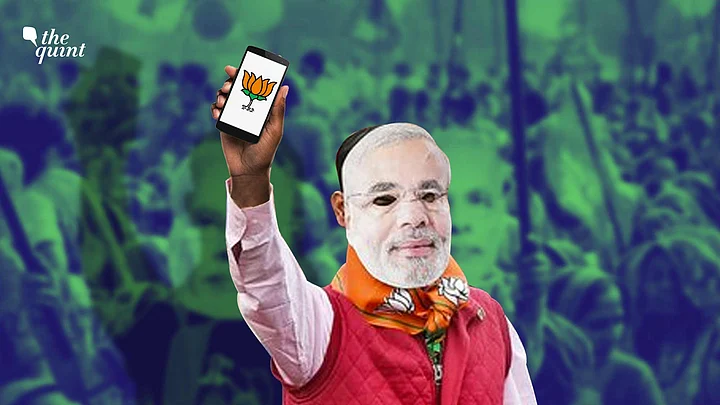While loudspeakers have fallen silent during the 48-hour mandatory ‘silence period’ leading up to the Delhi Assembly elections on Saturday 8 February, Bharatiya Janata Party’s election advertisements are still running on Facebook.
According to data on Facebook’s ads library, the BJP’s official campaign ads are now being paid for and running on the party’s proxy Facebook pages, reaching voters across Delhi. Two prominent proxy pages – AAPKePaap and Main Hoon Dilli – have at least 18 active election ads running as of 3 pm on Friday.
The BJP’s official “Desh Badla Ab Dilli Badlo” election campaign ads, which end with a text saying “Kamal ka button dabayenge, BhaJaPa ko laayenge”, are running on Main Hoon Dilli. The proxy page mirrors the BJP’s official page, except its sponsor is unknown and the contact number unreachable.
The violation appears to follow a pattern and is identical to the violations by the BJP during the seven-phases of the Lok Sabha elections in April-May 2019.
What Does the Law Say ?
Section 126 (1) of the Representation of the People Act, 1951, states that “No person shall display to the public any election matter by means of cinematograph, television or other similar apparatus in any polling area during the period of forty-eight hours ending with the hour fixed for the conclusion of the poll for any election in that polling area.”
The 48-hour silence period for the third phase of elections commenced on Thursday evening and will be in place till the end of polling on Saturday.
During this period, no individual is allowed to propagate or display to the public any election-related content. While this provision has been implemented offline, it appears to have been brazenly flouted in the online space.
What Is Happening?
AAP Ke PAAP and Main Hoon Dilli have spent a combined Rs 5,37, 948 on the Delhi election campaign.
While AAP ke PAAP has spent Rs 1, 91, 657 on 266 paid promotions, Main Hoon Dilli has shelled out Rs 3, 46, 291 on 240 ads.
Additionally, while AAP Ke PAAP’s focus throughout the campaign has been on attacking the Aam Aadmi Party and Delhi Chief Minister Arvind Kejriwal through images and memes; Main Hoon Dilli was highlighting the BJP’s promises through promotional videos.
Among the cross-posting of advertisements on Friday during the silence period are videos showing residents of Delhi criticising the incumbent AAP government. On the proxy page, however, the video appears with a header and footer saying, “Here Kejriwal us lying to the shopkeepers of Delhi and there Modi has converted 10 lakh shops from Leasehold to Freehold”.
According to information on the advertisement provided by Facebook, the proxy page had paid Rs 399 to have the video reach Delhi’s Facebook users.
All the twelve active promotions running on AAP Ke Paap page portray Kejriwal as corrupt, scam-ridden and unable to live up to his promises.
Lok Sabha to Delhi Elections: A Pattern Emerges
This coordinated behaviour on Facebook is significant because it points to a larger pattern, identical to the one observed during the BJP’s campaign for the Lok Sabha elections in April-May 2019.
Three Facebook pages, claiming to be independent supporter pages – Nation With NaMo, My First Vote for Modi, and Bharat ke Mann ki Baat were among the biggest spenders on election-related advertisements on Facebook. The three had collectively spent Rs 4.5 crore on 13,208 advertisements between February and April.
Huffington Post India, on 4 April, published an investigative story on how the Bharatiya Janata Party (BJP) turned a women’s NGO into a secretive but highly influential propaganda machine.
The Quint had reported during the Lok Sabha elections that the BJP’s official page ran advertisements worth Rs 51 lakh, in violation of the mandatory 48-hour silence period, before the first phase of polling of Lok Sabha elections.
The BJP, in fact, violated the mandatory 48-hour silence period leading to and during each of the seven phases of polling in the Lok Sabha Elections. This was carried out despite the Election Commission of India’s “Code of Ethics” for the General elections that social media platforms like Facebook had submitted to the EC.
(At The Quint, we question everything. Play an active role in shaping our journalism by becoming a member today.)
